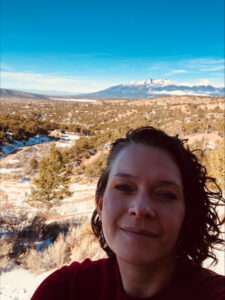PA Susanna Storeng Pushes for Legislative Changes in Colorado to Improve Access to Care
Because of PA Practice Laws, Storeng Can No Longer Provide Vital Services in her Rural Community
By Jennifer Walker
October 9, 2022

Earlier this year, Susanna Storeng, DMSc, MPAS, CPAAPA, DFAAPA, PA-C, who practices in Colorado, had a patient who wanted to switch to oral birth control, which would require removing her Nexplanon, a birth control implant that is inserted in the upper arm. Storeng had a shared decision-making conversation with the patient, bringing up the point that she had struggled with medication compliance in the past to make sure the patient was certain about her decision. Because the patient still wanted to remove the implant, Storeng did so, telling her that she could reinsert the Nexplanon if she changed her mind.
In the next few months, the patient struggled with taking her oral birth control and got pregnant. Ten months after having her child, she came back to Storeng and asked her to insert a Nexplanon again. But by then, Storeng wasn’t able to do so. Her supervising physician – the term currently used in Colorado to describe the PA-physician relationship – had changed, and PAs in Colorado are not allowed to perform procedures that their supervising physician does not actively participate in.
“At this time, since my supervising physician does not insert IUDs and has not been trained in Nexplanon, I can’t provide that service,” says Storeng, who until her recent resignation was the chief clinical officer at High Plains Community Health Center (HPCHC) in Lamar, Colorado, a rural town with a population of about 7,600 people.
To help the patient get the Nexplanon placed, Storeng got her an appointment with an NP at her clinic. But the patient never came back to have the implant inserted. “We see this a lot with our underserved population throughout the nation,” says Storeng, who is now focused on her full-time clinician practice with HPCHC to provide needed medical care to the community. “Whether it’s in rural areas or unserved areas of our cities, if a patient can’t get something taken care of at that time, it’s really hard for them to do it at a different time.”
Along with not being able to provide long-acting reversible contraceptives like Nexplanon and other IUDs, Storeng is also unable to prescribe PrEP, an HIV-prevention medication, or give Hepatitis C treatment, despite having the training and experience to provide these services. While her patients are able to have IUDs placed at her clinic with another provider, they must seek out other healthcare facilities located one to three hours away for Hepatitis C treatment and PrEP medication.
“I can’t perform the duties that my patients need, therefore their access is limited, and they don’t have care in a timely way,” says Storeng, adding that patients in rural communities might not have the transportation, childcare, or emotional capacity to travel long distances for care. “Those social determinants of health that we have all heard about are much bigger factors in rural areas than they are in other places.”
Finding Her Place in Colorado
Storeng grew up in Augusta Township, a rural area in Michigan. She was an opera singer as a child and studied music at Eastern Michigan University for a few years. Although she loved music, Storeng decided to look for a career that she felt would help her support a family. Her father practiced as a primary care PA for about six years, so he suggested that Storeng look into the field. While still in college, Storeng worked at an assisted living facility and volunteered in the ED, and she started taking her prerequisites for a PA program.
In 2003, Storeng completed the PA program at the Pennsylvania Institute of Technology. She thought she would specialize in infectious diseases or practice in adolescent care treating STDs. But, through her rotations at school, she realized that primary care is a good fit for her.
“I love the relationships that are built with patients in primary care,” she says. “In my rotations, the providers knew their patients. They had conversations not just about health, but about other things that were important. These weren’t things in the chart, but they remembered them because of these strong, really long-standing relationships.”
After graduating and spending more than two years working in primary care in Chetopa, Kansas, a rural community with a population of 800 people, Storeng moved to Colorado to begin her first stint at HPCHC. Here, Storeng says, “It was amazing to see how much the patients appreciate the care you provide. Because we live in this small community, we’re all part of this connected environment, and we all know what’s going on. We are there for each other.”
Despite enjoying her work in Colorado, Storeng, who was pregnant with her first child in 2008, then moved back to Michigan to be closer to family. For the next eight years, she worked as a primary care provider in her home state, as well as a consulting provider with a gastroenterologist, which meant her schedule was unpredictable.

In 2015, as she was preparing to leave for work, Storeng vividly remembers a moment with her then six-year-old daughter that changed everything. Looking down on Storeng from the top of the stairs, her daughter asked if Storeng would be at her soccer practice, or if she would be home for dinner, or if she would be able to tuck her in that night. Storeng, who also had a four-year-old son then, had to answer, again and again, that she just didn’t know. “It was devastating,” she says. “I thought to myself, ‘She just wants me to be a part of her life, and I can’t even tell her if I’ll be able to tuck her in tonight.’”
After this exchange, Storeng realized how much she missed Colorado. In 2016, Storeng and her family moved back to Lamar, where she started working again at HPCHC. “It’s the best job I’ve ever had,” she says. “There have been a lot of ups and downs, but I love the community I serve.”
The Impacts of Colorado’s PA Practice Laws
The High Plains Community Health Center, a federally qualified health center in Lamar, opened in 1995 as a dental office. Today, the center offers dental, behavioral, and medical health services to 8,500 to 9,000 patients annually, which accounts for 75 to 80 percent of the population of the area. If patients need tertiary care, such as an appointment with a cardiologist, or need to have an emergency procedure, such as a hip replacement, they will take a helicopter ride to either Pueblo or Colorado Springs, the nearest cities, each about two hours away, for further care.
In the medical department, Storeng is one of three PAs at the center. The staff also includes two NPs, one pediatrician, and one family medicine physician, who is Storeng’s supervising physician. Until late 2021, Storeng had been placing IUDs and prescribing PrEP when needed as part of her regular patient care. She also offered Hepatitis C treatment and is the only provider in the tri-county area who has been approved by the Colorado Department of Public Health & Environment to do so.
But last December, when a physician left the center, Storeng and the other PAs were no longer able to offer services they had long been providing. Although Storeng’s patients are able to get a separate appointment to have IUDs placed with another provider at the center, they may not return for that appointment or feel comfortable going to someone new for their care.
In the last nine months, Storeng has also had three calls from a patient navigator at a local rehabilitation facility who wanted to refer patients to her for Hepatitis C treatment. Each time, she has had to say that she is not currently allowed to provide that care, despite her training in this arena.
When it comes to getting PrEP for HIV prevention, Storeng says there aren’t many providers who are trained in and comfortable with prescribing this medication. “It’s also something that patients still have a hard time discussing,” she adds. “If you are at high risk for HIV transmission, it’s still unfortunately a very stigmatized situation that can make the patient uncomfortable speaking with someone new.”
Storeng’s supervising physician will be retiring at the end of this year, and the team is actively recruiting for a provider to replace him. “If we cannot recruit another family practice or primary care physician, we will either have to go to a collaboration model, like hiring a primary care physician contractor, or our PAs won’t be able to practice because of the legislation in Colorado.”

Advocating for Change
As a board member of the Colorado Academy of PAs (CAPA) and a member of the CAPA Governmental Affairs Committee, Storeng has been actively involved with modernizing Colorado’s PA practice laws. The goal is for PAs to no longer be tethered to one physician, but to be able to work with physicians in a variety of specialties as needed depending on each patient’s case.
“We want to work in a less formal type of collaboration,” says Storeng, who received her Doctor of Medical Science degree from the University of Lynchburg in Virginia in 2019. “Because as a primary care provider, I might collaborate with seven or eight different physicians on the care of one patient.”
PAs involved in advocacy in Colorado also want to be able to practice in a way that is similar to their NP colleagues. Along with getting their RN license, NPs have to work 750 hours with a physician in order to get their prescription license. But after that, they don’t have any supervisory language that is tied to their ability to practice. “They’re able to do pretty much anything that they’re trained and experienced in with no supervision,” Storeng says. “We’re really looking at obtaining more parity with the Nurses Act.”
For PAs in Colorado who want to advocate on behalf of their colleagues in the state, CAPA provides information about this specific legislative priority including a fact sheet about the bill, as well as a Zoom training session about how to reach out to legislators. PAs can then call their Colorado legislators to tell their stories, share data, and push for change.
For Storeng, her legislators in Colorado have been receptive to PAs’ situation because they understand that PAs and NPs are essential to having accessible healthcare in the state’s rural areas. “Advanced practice providers provide so much of the care because it’s hard to find providers for rural communities,” she says. “When there is a qualified and experienced provider who wants to be in a rural, underserved area, it’s important to do everything we can to make sure they can practice there and they want to stay.”
Jennifer Walker is a freelance writer in Baltimore, MD. Contact Jennifer at [email protected].
You May Also Like
PAs Take Pride in Improving Access to Care for LGBTQ Patients
Nevada’s PA Practice Laws Creating Barriers to Care
Country Living: Working as a PA in Rural Healthcare
Barriers to Care: Four PAs Talk About Serving Rural Communities During the Pandemic
Thank you for reading AAPA’s News Central
You have 2 articles left this month. Create a free account to read more stories, or become a member for more access to exclusive benefits! Already have an account? Log in.




